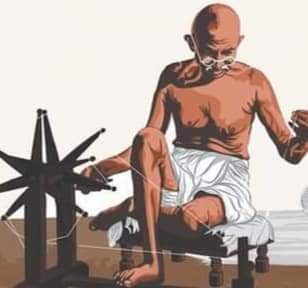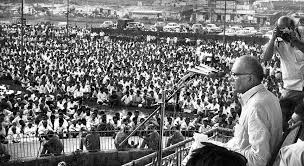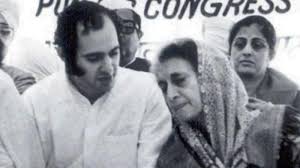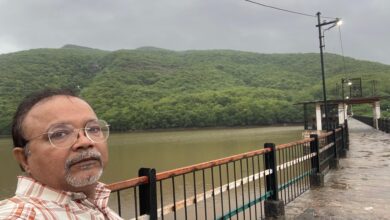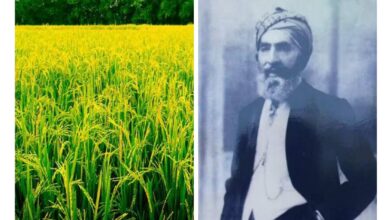The Great Trial of Gandhi: Its Historic Context and Significance
Siby K. Joseph
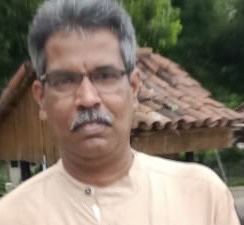
We are observing the centenary of the Great Trial in which Mohandas Karamchand Gandhi and Shankarlal Banker, editor, and printer and publisher respectively of Young India, who were trailed on charges under Section 124 A of the Indian Penal Code on 18th March 1922. In order to understand the significance of this trial we need to analyse the factors which ultimately led to the trial in the background of the Non-Co-operation movement in its historical context. Gandhi after the successful conduct of Satyagraha struggles in South Africa from 1906 to 1914, returned to India in January 1915.
He established the Satyagraha Ashram at Kocharab in Gujarat with the sole aim of using the Satyagraha method in the Indian soil. Gopal Krishna Gokhale, the mentor of Gandhi asked him to first acquaint himself with India before undertaking any political question. Loyal to Gokhale’s advice Gandhi toured the length and breadth of the country, “with eyes and ears open, but mouth shut.”
He began his Satyagraha struggles in Indian soil in 1917 with the Champaran Satyagraha, after which he never looked back. It was aimed at saving the poor farmers who were forced to cultivate Indigo by the British planters. It was followed by another Satyagraha struggle for the farmers who were facing miseries due to failed crops in Kheda district of Gujarat in 1918.He also successfully used the method of fasting to settle a dispute in the Ahmedabad Mill Workers Strike.
In 1919, the British government passed the controversial Anarchical and Revolutionary Crimes Act popularly known as Rowlatt Act basically to crush extremist nationalists. On 6 April 1919, Gandhi started nationwide Satyagraha against the unjust and brutal Rowlatt Act passed by the British government. In the Punjab province, the British reacted with great violence and the infamous Jallianwala Bagh massacre took place in Amritsar on 13th April 1919 in which troops and without warning fired upon the unarmed crowd and about 1500 people were killed on the spot.
This incident was turning point in the life of Gandhi. He completely lost faith in the British sense of justice. Here we can see the complete transformation of Gandhi who was a British loyalist into a hardcore rebel and non-co-operator challenging the Empire through the Non-Co-operation Movement in 1920.
This was the first major movement after the brutal suppression of the first War of Independence in 1857. Many factors contributed towards an intense urge for swaraj among the people. The deteriorating economic situation after the end of World War, Home Rule Movement started by Annie Besant and Bal Gangadhar Tilak, Khilafat wrongs, Government of India Act of 1919 and Jallianwala Bagh Massacre provided the congenial atmosphere for the launching the Non-Co-operation Movement.
In September 1920, Gandhi presented his plan of Non-Co-operation Movement at the special session of Indian National Congress in Kolkata. It was decided that the Non-Co-operation Movement would be launched on August 1, 1920. Lokmanya Tilak passed away on the same day and many people fasted to pay tributes to the memory of Tilak and took part in demonstrations and hartals as a part of the Non-Co-operation movement.
With the passing away of Tilak, Gandhi became the undisputed leader of the national movement. The annual convention of the Congress held at Nagpur in December unanimously approved the movement and adopted its new constitution duly drafted by Gandhi. Gandhi was convinced that the constitutional methods were inadequate to attain the goal of Swaraj and complete withdrawal of cooperation with the British was the only way before him. Gandhi promised Swaraj within one year if his Non-Cooperation movement is implemented in its entirety.
Louis Fischer, American biographer of Gandhi, in his classic work, Mahatma Gandhi — His Life and Times explains how Gandhi arrived at the idea of Non-Co-operation and its significance. He wrote “Indians could not simultaneously oppose the government and work with it. To boycott British exports was inadequate; they must boycott British schools, British courts, British jobs, British honours; they must non-co-operate. ‘Non-co-operation’ became the name of an epoch in the life of India and of Gandhi.
Non-co-operation was negative enough to be peaceful but positive enough to be effective. It entailed denial, renunciation and self-discipline. It was training for self- rule.” People from all walks of life including students, youth, lawyers, government servants, working class and farmers put into action Gandhi’s clarion call of Non-Co-operation and the British Government was literally paralyzed. Prominent personalities registered their protest by returning titles and honours endowed to them by the British Government. In December 1921, the Government retorted with mass imprisonment of people. Tens of thousands of people were jailed for alleged violations of law by the government. Many leaders like Motilal Nehru, Chittaranjan Das, Maulana Azad, Lala Lajpat Rai and Jawaharlal Nehru were imprisoned.
Gandhi decided to intensify the movement and informed the Viceroy on February 1, 1922 that he intended to initiate civil disobedience in Bardoli, a small tahsil in the Surat District in the Bombay Presidency.
The Non-Co-operation Movement was in full swing throughout the country despite the repressive measures of the government. On 2 February 1922, volunteers under the leadership of Bhagwan Ahir, retired Army personnel, protested against high food prices and liquor sale at Chauri Chaura in Gorakhpur. They were beaten up by the local police and a number of leaders were detained at the Chauri Chaura police station. Further to this incident, on February 4 around 2,000-2,500 people marched to the market and picketed the roadside liquor shop. The police resorted to torture and their leader was imprisoned. Protesters demanded the release of the leader and anti-government slogans were raised. Police fired into the air to control the mob. It provoked the protestors and they started throwing stones at the police. Finally the police opened fire at them and three were killed and several others were injured. The situation was going out of the control and the enraged mob stormed into the police station and set it on fire leading to tragic death of 22 policemen.
Gandhi was highly disillusioned by the sudden violent turn of the movement and decided to halt at the national level. The resolutions were passed at the Working Committee at Bardoli which were subsequently adopted by the A.I.C.C meeting in Delhi on February 25, 1922. As the supreme leader of the movement Gandhi took the whole moral responsibility for the outbreak of violence. Leaders like Nehru considered the halting of the movement as a setback and it would extremely demoralize the workers who were in Jail. Gandhi was convinced about the rightness of the decision and decided to fast as a penance.
On March 1 1922, in consultation with key British administrators in India, Viceroy Lord Reading ordered the arrest of Gandhi. Gandhi was expecting his arrest and he wrote in Young India on March 9 ‘If I am Arrested’. ‘Rivers of bloodshed by the government cannot frighten me,’ he wrote, “but I should be deeply pained even if the people did so much as abuse the Government for my sake or in my name. It would be disgracing me if the people lost their equilibrium on my arrest.’ Finally Gandhi was arrested on March 10, 1922 and charged with sedition for writing three seditious articles in Young India. Gandhi was kept in prison for trial. Louis Fischer well known American biographer of Gandhi summarised the seditious articles in his book Mahatma Gandhi – His Life and Times. He wrote:
“The first of the seditious articles appeared in Young India on September 19, 1921, entitled Tampering with Loyalty’. ‘I have no hesitation in saying”, Gandhi wrote, ‘that it is sinful for anyone, either soldier or civilian, to serve this government— sedition has become the creed of Congress … Non-co-operation, though a religious and strictly moral movement, deliberately aims at the overthrow of the government, and is therefore legally seditious … We ask for no quarter; we expect none from the government.’
These words made the government case easy. If there was doubt, Gandhi made it even more explicit in a second article, A Puzzle and Its Solution’, in Young India of December 15, 1921. ‘Lord Reading’, he wrote, ‘must understand that Non-co-operators are at war with the government. They have declared rebellion against it … Lord Reading is entitled therefore to put them out of harm’s way.’
The third seditious article, ‘Shaking the Manes’, in Young India of February 23, 1922, cried out in the opening sentence, ‘How can there be any compromise whilst the British lion continues to shake his gory claws in our faces?’ Then sarcastically he informed the British that ‘the rice-eating, puny millions of India seem to have resolved upon achieving their own destiny without any further tutelage and without arms’. Adding that ‘no empire intoxicated with the red wine of power and plunder of weaker races had yet lived long in the world’, Gandhi said. The fight that was commenced in 1920 is a fight to the finish, whether it lasts one month or one year or many months or many years ...” It is interesting to note that Gandhi an Inner Temple lawyer at the preliminary hearing the day after his arrest, described his profession ‘farmer and weaver’ and pleaded guilty. The Great Trial was held in Government Circuit House at Ahmedabad on March 18, 1922, before Justice C. N. Broomfield, I. C. S., District and Sessions Judge, Ahmedabad . Sir J. T. Strangman, Advocate-General of Bombay, along with Rao Bahadur Girdharlal Uttamram, Public Prosecutor of Ahmedabad, appeared for the Crown.
Gandhi and Shankarlal Banker were undefended as no lawyers were appointed to represent their case. The members of the public who were present on the occasion included Kasturba Gandhi, Sarojini Naidu, Madan Mohan Malaviya, N. C. Kelkar, Smt. J. B. Petit, and Smt. Anasuyaben Sarabhai. The charges against them were of "bringing or attempting to excite disaffection towards His Majesty's Government established by law in British India, and thereby committing offences punishable under Section 124 A of the Indian Penal Code," in three articles published in Young India. After reading the charges the Judge asked Gandhi whether he pleaded guilty or claimed to be tried.
He replied "I plead guilty to all the charges. I observe that the King's name has been omitted from the charge, and it has been properly omitted."The Judge asked the same question to the second accused Shankarlal Banker, the publisher of Young India and he too readily pleaded guilty. The Court asked Gandhi whether he wished to make any statement on the question of sentence. Before reading his statement before the court he said “I have no desire whatsoever to conceal from this court the fact that to preach disaffection towards the existing system of Government has become almost a passion with me, and the Advocate-General is entirely in the right when he says that my preaching of disaffection did not commence with my connection with Young India but that it commenced much earlier.... than the period stated by the Advocate-General” The words uttered by him challenged the evil system of governance . He said “ I had either to submit to a system which I considered had done an irreparable harm to my country, or incur the risk of the mad fury of my people bursting forth when they understood the truth from my lips...I do not ask for mercy. I do not plead any extenating act. I am here, therefore, to invite and cheerfully submit to the highest penalty that can be inflicted upon me for what in law is a deliberate crime, and what appears to me to be the highest duty of a citizen.
He even went to the extent of saying “The only course open to you, the Judge, is, as I am going to say in my statement, either to resign your post, or inflict on me the severest penalty if you believe that the system and law you are assisting to administer are good for the people. I do not except that kind of conversion. But by the time I have finished with my statement you will have a glimpse of what is raging within my breast to run this maddest risk which a sane man can run.”
He explained in his written statement how he was transformed from a staunch loyalist and co-operator to an uncompromising disaffectionist and non-co-operator. He indicted the government for the Rowlatt Act, the Jallianwala Bagh massacre which made him a rebel of the British Government. He was highly critical of the colonial economic policy which had impoverished millions of Indians.
He said “This cottage industry, so vital for India’s existence, has been ruined by incredibly heartless and inhuman processes as described by English witness. Little do town dwellers how the semi-starved masses of India are slowly sinking to lifelessness. Little do they know that their miserable comfort represents the brokerage they get for their work they do for the foreign exploiter, that the profits and the brokerage are sucked from the masses. Little do realize that the Government established by law in British India is carried on for this exploitation of the masses. No sophistry, no jugglery in figures, can explain away the evidence that the skeletons in many villages present to the naked eye. I have no doubt whatsoever that both England and the town dweller of India will have to answer, if there is a God above, for this crime against humanity, which is perhaps unequalled in history.”
He eloquently put forward a staunch defence of the freedom of speech and expression He said “Section 124 A, under which I am happily charged, is perhaps the prince among the political sections of the Indian Penal Code designed to suppress the liberty of the citizen. Affection cannot be manufactured or regulated by law. If one has no affection for a person or system, one should be free to give the fullest expression to his disaffection, so long as he does not contemplate, promote, or incite to violence. But the section under which mere promotion of disaffection is a crime. I have studied some of the cases tried under it; I know that some of the most loved of India’s patriots have been convicted under it. I consider it a privilege, therefore, to be charged under that section. I have endeavored to give in their briefest outline the reasons for my disaffection. I have no personal ill-will against any single administrator, much less can I have any disaffection towards the King’s person. But I hold it to be a virtue to be disaffected towards a Government which in its totality has done more harm to India than any previous system. India is less manly under the British rule than she ever was before. Holding such a belief, I consider it to be a sin to have affection for the system. And it has been a precious privilege for me to be able to write what I have in the various articles tendered in evidence against me.”
When Gandhi sat down after reading his written statement Justice Broomfield bowed to the prisoner, and pronounced the sentence. The utterances of Gandhi created indelible imprints in the minds of Justice Broomfield that is why while convicting Gandhi he said: “The law is no respecter of persons, nevertheless, it will be impossible to ignore the fact that you are in a different category from any person I have ever tried or am likely to try. It would be impossible to ignore the fact that, in the eyes of millions of your countrymen, you are a great patriot and a great leader. Even those who differ from you in politics look upon you as a man of high ideals and of noble and of even saintly life. I have to deal with you in one character only. It is not my duty and I do not presume to judge or criticise you in any other character. It is my duty to judge you as a man subject to the law, who by his own admission has broken the law and committed what to an ordinary man must appear to be grave offence against the state.”
The judge then announced that Gandhi must undergo imprisonment for six years, and added that if the government later saw fit to reduce the term ‘no one would be better pleased than I’. Mr. Banker received one year in jail and a fine of one thousand rupees. Gandhi was sentenced to six years in prison by the judge and added that if the government later saw fit to reduce the term ‘no one would be better pleased than I’. Similarly Shankarlal Banker was given one year in jail and a fine of one thousand rupees.
The Great trial of Gandhi at the Ahmedabad Sessions Court conducted by Justice C N Broomfield was epochal for many reasons. The trial in a sense helped the antagonistic forces to arrive at a dialectic process to understand truth in its totality not confined to the legal system or the government.
It may be the first time in the history of a court where the judge bowed before the convict and described him as a saintly personality. He was also indirectly pleading with the government to reduce the jail term. Through this trial Gandhi was successful in trailing the British government in the moral court of humanity. The trial also emphasised the need for revising the penal code of justice based on unjust law. It is also a strong reminder that disaffection with unjust government is a primary duty of the citizen.
Dr. Siby K. Joseph is a noted Gandhian Scholar and Director of Sri Jamnalal Bajaj Memorial Library Research Centre, Sevagram Ashram Pratishthan, Sevagram Wardha-442102 (Maharashtra) Email:directorjbmlrc@gmail.com

